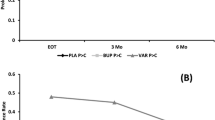Abstract
Rationale: Bupropion is used clinically as a treatment for smoking cessation, but the processes by which it reduces smoking are poorly understood. Bupropion shares some neurochemical actions and behavioral effects with the psychostimulant amphetamine, and it has been shown that amphetamine increases smoking when administered acutely. The effects of single doses of bupropion on smoking have not been studied but, based on its similarities to amphetamine, we postulated that acute bupropion would also increase smoking. Objective: To measure the effects of single doses of amphetamine and bupropion on smoking and craving for cigarettes in smokers. Methods: Cigarette smokers who were not trying to quit participated in a three-session study in which they received placebo and a single dose of either d-amphetamine sulfate (10 and 20 mg; n=10) or bupropion hydrochloride (150 and 300 mg; n=12) after overnight abstinence. The three outcome measures were: i) subjective and behavioral effects of amphetamine and bupropion after a period of acute abstinence, ii) effects of amphetamine and bupropion on subjective responses to a single, smoked cigarette, and iii) effects of the drugs on number of cigarettes smoked during an ad libitum smoking period. Results: After the acute abstinence and before smoking, both amphetamine and bupropion increased self-reported mood and euphoria, but did not change ratings of craving or withdrawal. After subjects smoked a single smoked cigarette, they reported that bupropion reduced ratings of "buzzed" and "intensity". During the period of ad libitum smoking both amphetamine and bupropion increased the number of cigarettes smoked. Conclusion: Acute doses of both bupropion and amphetamine increase smoking in non-treatment-seeking smokers without altering ratings of craving or withdrawal. Bupropion reduced some of the sensory responses to the smoked cigarette. It remains to be determined why bupropion increases smoking when administered acutely under controlled conditions, while it helps to reduce smoking in patients trying to quit.
Similar content being viewed by others
Author information
Authors and Affiliations
Additional information
Electronic Publication
Rights and permissions
About this article
Cite this article
Cousins, M.S., Stamat, H.M. & de Wit, H. Acute doses of d-amphetamine and bupropion increase cigarette smoking. Psychopharmacology 157, 243–253 (2001). https://doi.org/10.1007/s002130100802
Received:
Accepted:
Published:
Issue Date:
DOI: https://doi.org/10.1007/s002130100802




